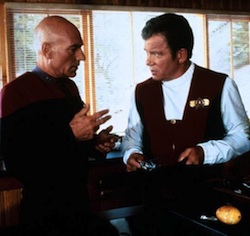Captain Kirk and Captain Picard team up to save the world. Sounds like a sure thing, right?
Unfortunately, Star Trek: Generations is mired in so much controversy that even the people who worked on the film have apologized for the writing and claimed that it was essentially one giant error. In addition, it’s fairly well known that William Shatner was not exactly a boy scout (well, to be fair, Kirk never was either) during the filming; set rumors insist that he was difficult to work with, irritable, and who can blame him? This is Captain Kirk we’re talking about here, and he dies because he falls off the side of a rock face with part of a bridge? A bridge?! Whose bright idea was that?
And yet I don’t hate this movie the way that so many fans do. Because for all its flaws, Generations is asking a very important question about the captain who effectively created the mold for all those who followed in Trek canon: is it worth it? Is being Captain James T. Kirk worth it?
Maybe it wasn’t the question that fans wanted them to ask, but it was a question that needed to be answered; the quintessential Kirk vs. Picard battle among the Star Trek fanbase is one that consistently seems to come out in favor of Picard and, frankly, that just doesn’t seem fair. Picard is a mature, level-headed, eloquent man; he is the sort of hero that our forebrain wants us to be. Jim Kirk is an Iowa cowboy with a penchant for turning no-win scenarios into I-win scenarios; the kind of hero that our hindbrain embraces. Both of these men are necessary to Starfleet, but there’s a reason why Kirk was the prototype (other than the fact that it was a younger Gene Roddenberry who created him). There’s a reason why Picard is awed by him, even when he’s yelling at him to get off his high horse (literally) and join the fight again.

I would argue that the villain in this film is not Malcolm McDowell’s Dr. Tolian Soren: the villain is the Nexus that both Kirk and Picard find themselves trapped in. While underdeveloped at the scripting level, it is a classic sort of Star Trek nemesis—the evil that our heroes are struggling to overcome is their own complacency in this existence where dreams are placed in the palm of their hands. It is a particular type of bliss that both men have fought against vehemently through their careers, Kirk in particular: his choice to put an end to an effective Eden in “The Apple,” his destruction of Spock’s spore-induced happiness in “This Side of Paradise,” his refusal to relinquish his own personal anguish in Star Trek V.
But Kirk is older and feeling the wear of years more keenly, especially as he watches a new crew take on the Enterprise-B at the start of the film. Picard too, is questioning the merit of his life’s path after his brother and nephew, the only other living members of the Picard line, have died in a fire. What the Nexus offers them both is peace with the part of their lives that they find lacking, the “empty house” as Kirk puts it. (See, Spock, this is what happens when you decide to go be an ambassador forever and leave your friends behind without a number to reach you.)
It’s a hard pitch to pass up, and Kirk presents some ironclad reasons for his wanting to accept paradise for a change. “I was saving the universe when your grandfather was in diapers,” is one of my personal favorites on that account. But we know Kirk well enough to know this can’t last, and it’s not long before he calls a mirage a prison and comes back to the party with all his characteristic gusto. It’s not so much the call of duty as it is the call of what Spock calls his “best destiny.” Kirk’s character has always had something of a “chosen one” quality to it; now all that remains is for Picard to see it in action.
No, the threat isn’t the most frightening or dramatic one that they’ve ever come across. No, there is nothing particularly epic about the way the fight progresses. No, Kirk does not go down in a blaze of glory. But then, he did tell Spock and Bones that he always knew he’d die alone, didn’t he?
And this is what it means to die alone; out of his time, off of his ship, on a planet that no one has ever heard of, with a man who only knows him through history books. All whimper, no bang, and the knowledge that mortality has finally decided to sever his godlike, lifelong streak of luck. So, you have to ask the question again: was it worth it? Was being James Tiberius Kirk—with all that pain, the doubt and the losses, the risks, the loneliness—worth it?
“It was…fun.”
You damn well bet it was.
With this appreciation, Tor.com’s Star Trek Movie Marathon comes to a close. We hope you enjoyed the appreciations, giveaways, and essays! We had a lot of fun putting it all together. You can check them all out in the index linked in this paragraph or by clicking the red link at the top of the page.
Tor.com is definitely not done talking about Star Trek. Check back with us on Monday! We’ve got some exciting stuff for fans of the original series and Next Gen alike. Phasers set to debate! (Sorry, we had to.)
Emmet Asher-Perrin thinks that all of this probably started when her parents took her to a movie theater for the very first time. The film was Star Trek IV: The Voyage Home and she—allegedly—got very excited when they freed the whales. It was all “best destiny” from there. You can bug her on Twitter and read more of her work here and elsewhere.










